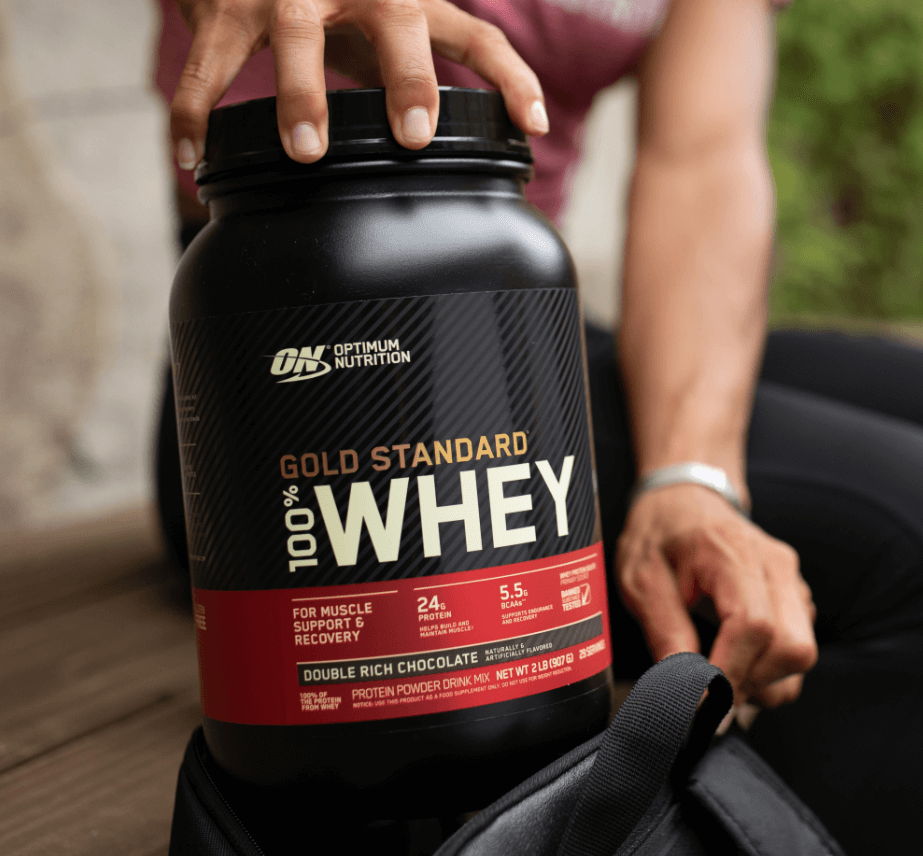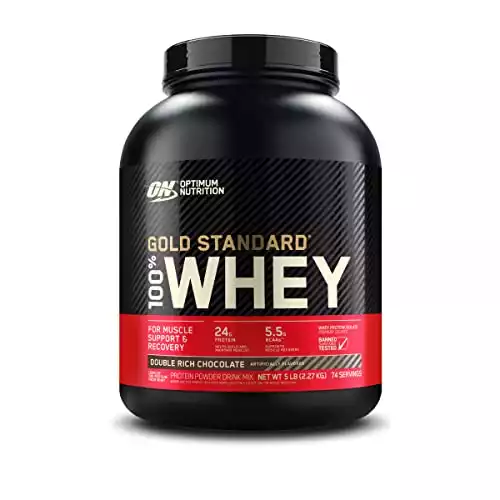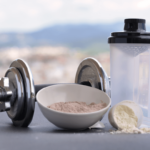As far as achievable workout ideas go, not supplementing your training with adequate dietary protein can be one of the biggest in your fitness journey. Not only does it help your muscles recover after workouts, but it can also be essential for lean muscle growth and maintenance.
If you don’t have time to make a protein-rich meal every day and you want to reap the benefits of dietary protein, whey protein concentrate can be an excellent choice to fill in the nutritional gaps that may be present in your normal daily routine. Among the potential supplements that are equally effective at delivering the benefits of supplemental protein as they are delicious, one stands out: Optimum Nutrition Gold Standard Whey Protein.
Jump to:
- Why You Should Trust BoxLife
- Who Is This Guide For?
- How We Picked the Best Products
- How We Graded the Product
- The Product – Optimum Nutrition Gold Standard Whey Protein
- What to Pay Attention to When Buying Protein Powder
- The Remarkable Benefits of Protein Powder that Can Elevate Your Health
- Frequently Asked Questions:
Why You Should Trust BoxLife
The entire BoxLife team is passionate about health and fitness, with long-term personal experience in the industry. We believe in harnessing the full potential of one’s body and mind to perform at elite levels, including proper rest and nutrition. While the primary source of protein for most people should come from their regular daily diet, we understand that the convenience of a supplement can be a tremendous asset when it comes to increasing the effects of a workout while maintaining a healthy lifestyle.
No one can deny the impact that quality products have on our routines, from powering our workouts to providing the necessary nutrients. We understand that everyone is unique and has different needs, which is why even the best products won’t be worth their weight in gold if they don’t meet an individual’s specific requirements.
But as experienced product testers, we take the guesswork out of it and analyze the different elements of a product so that you don’t have to. We focus on the science and the details in terms of the ingredients, the manufacturing processes, the nutritional facts and even how a product tastes.
Who Is This Guide For?
If you’re struggling to find the appropriate dietary supplements for your fitness journey, you might be looking for a comprehensive guide that covers all aspects of whey protein concentrate. This guide is designed to help you learn about the science behind whey protein, understand the different types available, as well as determine the timing and dosage that works best for you.
If you’re tired of scanning the product label for nutritional details or settling for a low-grade product, then you’ve come to the right place. Whether you’re a beginner in fitness or an experienced lifter, we’ll help you understand how to get the most out of your training and nutrition plan.
How We Picked the Best Products
It’s no secret that there’s a vast array of whey protein products on the market, with some companies offering more than a dozen different options. But not all items are created equal, thanks to differences in the ingredients, manufacturing processes, and even the nutritional facts on the product label. Some have higher concentrations of essential amino acids, while others might contain additives or other elements that could potentially interfere with your body’s natural balance.
Our team of fitness and nutrition experts conducted extensive research on the various whey protein options available, from brands both big and small. We looked at real-world reviews and discussion threads across Reddit and Quora, which provided us with invaluable insight into the pros and cons of each product. Additionally, we analyzed consumer reviews across Amazon, Titan, and Rogue Fitness, all of which had a wealth of information regarding the effectiveness and taste of different whey protein powders.
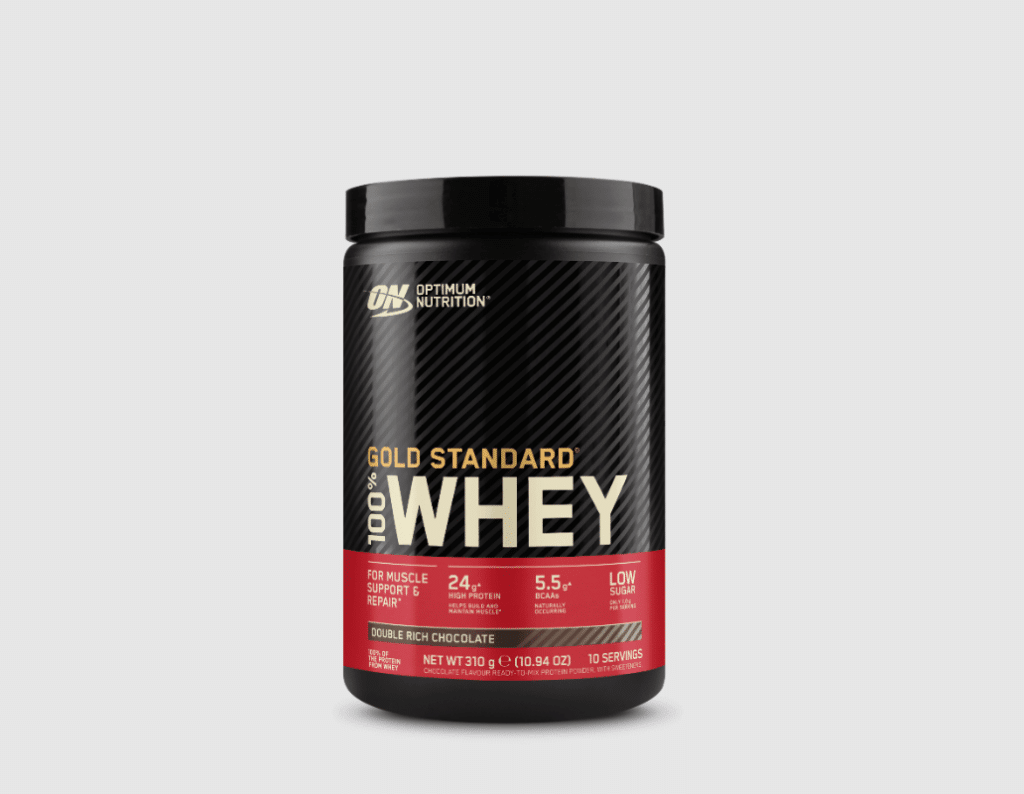
How We Graded the Product
When we singled out the Gold Standard Whey Protein, we looked at all of the factors that make a generally admirable supplement, with an emphasis on the safety and effectiveness of the product. We weighed this against our own personal preferences, as well as the overall feedback from customers who have used the product. We then graded it based on these metrics, scrutinizing the product from all angles and taking into consideration all of its elements.
- Protein Intake – As the sole source of protein in the product, we carefully considered how much it would offer us and how quickly our body could absorb it. The types of proteins used in the Gold Standard Whey Protein are all of high quality and fast-acting, which means that the body can use them quickly and efficiently. The whey formula is based on a single-source concentrate of protein, making it much more bioavailable than other options.
- Taste and Texture – We looked at the flavor profile of the product to ensure it was pleasant to consume and didn’t leave a dull, lingering taste. We also paid attention to the texture of the powder itself, as it should mix well with any liquid without leaving behind clumps or chunks. If it’s too gritty or chalky, it’s certainly not going to be enjoyable. Not to mention the metabolic impact that could have.
- Calorie Content – We wanted to make sure that the product would supply us with enough energy to fuel our workouts without excessively taxing our liver and kidneys. Naturally, workout supplements tend to contain some calories, but not at an excessive level. The lower the calorie content, the better it is for our overall health and well-being.
- Carbohydrates – While carbohydrates are an essential part of any balanced diet, we wanted to ensure that they were kept at a manageable level. Their integral part in the energy production process can’t be denied, which inherently contributes to better muscle recovery and faster gains. But if there’s too much, it can lead to bloating, excess body fat, and other negative effects.
- Amino Acid Profile – The vital amino acid content of a product is another important consideration when evaluating whey protein. Essential amino acids are vital for the repair and growth of lean muscle mass and tissue, with gradual absorption giving a steady concentration throughout the day. Once they’re depleted, our bodies start to break down proteins and use them for fuel, which could lead to negative effects like muscle fatigue and weight loss.
- Portion Size Options – How much of the product is actually in each serving determines the cost-effectiveness. The more servings you get from the product, the better value it is for your money. We looked at how many scoops each container contains and the weight of those portions, which directly translated into the cost per scoop.
The Product – Optimum Nutrition Gold Standard Whey Protein
If you want to facilitate healthy muscle building and recovery after intense workouts or simply want to maintain a lean and toned physique, then this product is definitely for you.
- Facilitates healthy muscle building in teenagers
- Great for supporting recovery after intense workouts
- Contains traces of soy
- Has artificial sweeteners to improve taste
A quick glance at the actual product packaging offers an immediate overview of what’s in store. The striking red and black visuals convey a sense of confidence and power, which is usually an indicator of a quality product. The label displays the essential information regarding the ingredients and nutrients contained in each scoop, with transparent figures making it easy to compare with other brands.
The container also mentions the slow-digesting aspect of the whey formula, which helps to keep amino acid concentrations steady throughout the day. It doesn’t contain any artificial additives, sweeteners, or other elements that could potentially interfere with your body’s natural balance. While it may not be suitable for vegan diets, it is gluten-free and can be enjoyed by lactose-intolerant individuals.
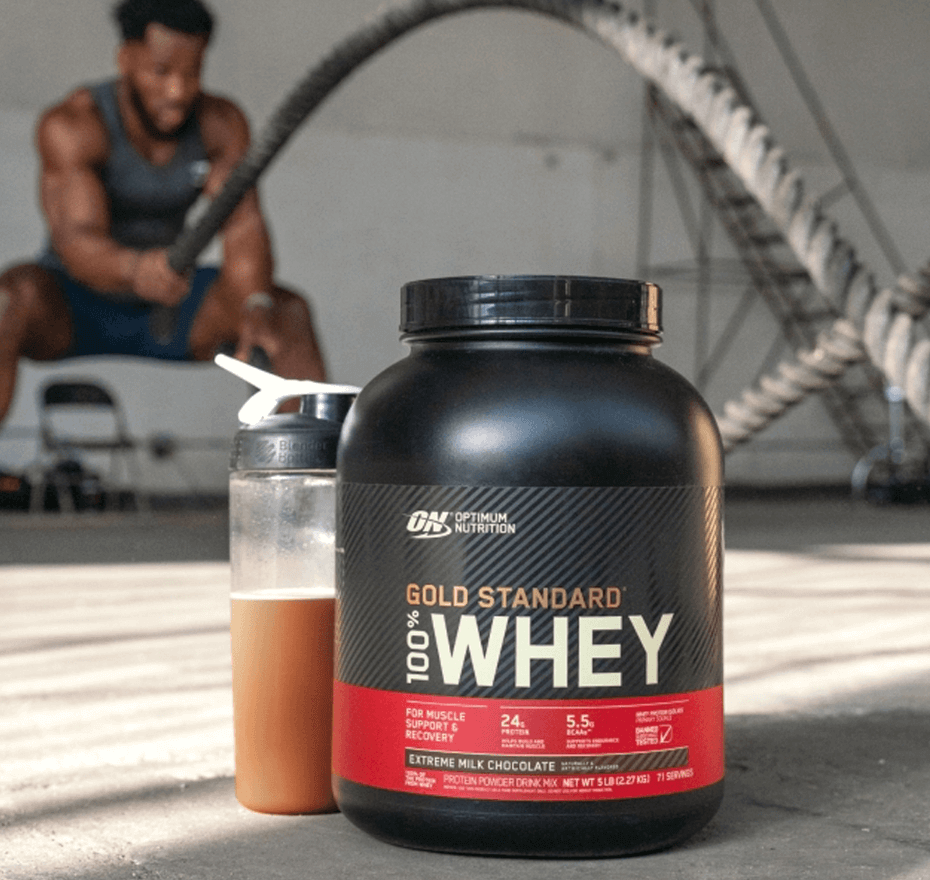
Pros
- Solid range of flavors to choose from
- Packed with essential amino acids and carb-rich energy sources
- High-quality protein blend with a slow-digesting formula
- Zero artificial additives, sweeteners, or flavorings
- Fantastic value for money
Cons
- Slightly thin consistency when mixed with water
- Some flavors can be a bit too sweet
Key Specs
| Calories Per Serving | 120 – 130 |
| Protein Per Serving | 24g |
| Fat Per Serving | 0 – 1.5g |
| Carbs Per Serving | 3 – 4g |
| BCAAs | 5.5g |
Why It’s Great
Optimum Nutrition’s dedication to providing superior quality products is clearly evident when you take a closer look at the Gold Standard Whey Protein. Its blend of both whey protein isolate and concentrate, as well as hydrolyzed whey peptides ensures that your body is adequately supplied with essential amino acids. The former provides the building blocks for strong muscles, while the latter helps to fuel your workouts and optimize recovery time.
The whey formula also packs a punch of energy from carbohydrates, which helps to maintain steady blood sugar levels and promote muscle growth. Their carefully calibrated blend of both fast and slow-digesting proteins ensures that you get a steady supply of energy throughout the day, preventing muscle fatigue or weight loss. With each serving containing no artificial sweeteners, flavors, or colors, you can trust that you’re getting only the best ingredients in your protein shakes.
Moreover, lactose-intolerant individuals will be pleased to know that the whey isolate used in the product is heavily filtered to remove most of the potential allergens. This makes it much easier to digest, allowing you to consume it without any adverse effects. If you’re still experiencing any discomfort, it’s recommended that you take a digestive enzyme supplement alongside the whey protein for the most promising results.
Additionally, active ingredients like conjugated linoleic acid (CLA) and branched-chain amino acids (BCAA’s) further bolster its performance potential. These ingredients have been clinically proven to help athletes build lean muscle mass, delay fatigue, and combat muscle breakdown. The combination of these two compounds also helps to reduce cholesterol levels, increasing the overall health benefits of the product.
This is particularly useful for people who want to shed weight in a healthy manner, as it helps to fuel their workouts without causing unpleasant digestive issues. It operates by providing the necessary energy to sustain intense exercises, while simultaneously suppressing cravings and reducing levels of body fat. The inherent low-calorie content of the product ensures that you aren’t consuming any excess calories, which is key for weight management.
Another blend of enzymes is used to further optimize the mixture, with the aim of improved digestion and better absorption rates. That would be Aminogen, a patented formula containing enzymes that help to break down proteins and make them easier to digest. This makes it ideal for people who experience digestive problems after consuming whey protein, as the added enzymes can help to reduce discomfort.
In terms of taste and solubility, the Gold Standard Whey Protein delivers outstanding results. The powder quickly dissolves in any liquid thanks to its instantized form, allowing you to enjoy a smooth shake every time. It also mixes well with other ingredients like yogurt, oatmeal, and smoothies for more creative recipes. This is mainly due to the addition of soy lecithin, which is a natural emulsifier that helps to keep the powder’s particles suspended in solution.
As for the multitude of flavors, a total of 18 are available for purchase. From classic options like rich chocolate and vanilla flavor to more exotic tastes like mocha cappuccino and cookies and cream, each flavor provides a unique twist to your shakes. The whey protein also adds an indulgent sweetness without the need for any artificial sweeteners, which makes it much healthier than other products on the market. Not to mention, the pleasant aroma will tantalize your taste buds and leave you feeling refreshed for hours.
Depending on your body composition and fitness goals, you may take anywhere from 6 servings per day to just one. Each container contains anywhere from 10-30 servings, depending on the size you choose, which means it’s an incredibly cost-effective option for both novice and experienced athletes alike. The sheer range of active ingredients, flavors, and portion sizes make the Gold Standard Whey Protein an outstanding value for money.
The track record of effectiveness of this whey powder is further highlighted by its digestive enzyme blend and carefully calibrated macronutrient profile. The two work in tandem to ensure maximum absorption of the essential amino acids, increased muscle recovery time, and improved energy levels throughout the day.
Who It’s Best For
The amounts of protein and other macronutrients in this whey powder make it ideal for athletes who need a steady supply of energy to maintain their performance. It acts as an excellent complement for those on a weight-management program, as it helps to reduce hunger cravings and increase fat burning. The lactose-free formula also contributes to its digestibility, with minimal amounts of indigestible substances remaining after the filtration process. It doesn’t overwhelm the stomach or cause any bloating, making it an excellent choice for people who experience gastrointestinal discomfort after consuming high-protein meals.
What to Pay Attention to When Buying Protein Powder
Protein powder has become a staple in the diets of fitness enthusiasts, athletes, and health-conscious people worldwide. Whether you’re looking to build muscle, support weight loss, or simply increase your daily protein intake, choosing the right protein powder is crucial. Still, with so many things to consider, how do you know which ones are the key factors to keep in mind to make an informed buying decision?
The Importance of Protein
Protein is an essential macronutrient that plays a crucial role in various bodily functions. It’s necessary for muscle repair and growth, immune system support, hormone production, and the maintenance of healthy skin, hair, and nails. Protein is also a satiating nutrient that helps control appetite and contributes to weight management.
Why Use Protein Powder?
While whole foods like meat, fish, dairy, and legumes are excellent sources of protein, many people turn to protein powder for its convenience and versatility. Protein powder allows you to quickly and easily increase your protein intake, making it especially valuable for individuals with active lifestyles or those with specific dietary goals.
Types of Protein Powder
Protein powders come in various types, each with its unique characteristics and benefits. Let’s learn more about the most common types.
Whey Protein
Whey protein is derived from milk during the cheese-making process. It is a byproduct of milk and is separated from the curds. It is one of the most popular and rapidly absorbed protein sources. It is rich in essential amino acids, particularly leucine, which is crucial for muscle protein synthesis.
Whey protein is ideal for post-workout recovery because it is quickly digested and helps repair and build muscle tissue. It provides a rapid influx of amino acids, making it valuable for muscle growth and repair.
Casein Protein
Like whey, casein protein is also derived from milk, specifically the curds portion. Casein protein is slow-digesting, providing a sustained release of amino acids over time. It forms a gel-like substance in the stomach, which can promote feelings of fullness. Casein protein is often used as a nighttime protein source due to its slow digestion, which helps support muscle recovery and reduce muscle breakdown during sleep. It can also aid in appetite control.
Plant-Based Protein
Plant-based proteins are derived from various plant sources, including peas, rice, hemp, soy, and more. These proteins cater to vegans, vegetarians, and those with dairy allergies or sensitivities. They often contain a blend of different plant protein sources to provide a complete amino acid profile.
Plant-based proteins are considered environmentally friendly and can support muscle growth and overall nutrition. They are often fortified with vitamins and minerals and are known for their digestibility.
Protein Content
Protein powders come in two primary forms: concentrate and isolate.
- Protein Concentrate: Contains varying amounts of protein (typically around 70-80%) with some fats and carbohydrates. It retains more of the original nutrients found in the protein source.
- Protein Isolate: Contains a higher protein concentration (often 90% or more) with minimal fats and carbohydrates. Isolates are typically lower in lactose and may be more suitable for those with lactose intolerance.
When choosing a protein powder, check the label for the protein percentage per serving. This indicates how much of the powder’s weight comes from protein. Higher percentages indicate a more concentrated protein source.
Amino Acid Profile
Protein consists of amino acids, some of which are essential, meaning they must be obtained through diet. A high-quality protein powder should contain all essential amino acids in sufficient amounts. BCAAs, including leucine, isoleucine, and valine, are vital for muscle growth and recovery. Many athletes and bodybuilders look for protein powders with a high BCAA content.
Flavor and Taste
Consider whether you prefer protein powders with natural or artificial flavors. Natural flavors are derived from real food sources, while artificial flavors are chemically created. Some people prefer one over the other, and natural flavors are often considered a healthier option.
Furthermore, check the sweeteners used in the protein powder. While some products use natural sweeteners like stevia or monk fruit, others may contain artificial sweeteners like sucralose or aspartame.
Ingredients and Additives
Inspect the ingredient list for fillers and thickeners, such as maltodextrin or carrageenan. Some people prefer protein powders with minimal additives to avoid unnecessary ingredients. Also, be aware of any artificial additives like colors, preservatives, or stabilizers. These additives are often used for aesthetic purposes but may not contribute to the nutritional quality of the product.
Texture and Mixability
Consider the texture of the protein powder when mixed with water or other liquids. Some powders have a smoother, creamier texture, while others may be grainy or chalky. Good mixability is essential for a pleasant drinking experience. Look for protein powders that blend easily and don’t clump or leave residue.
Digestibility and Tolerance
If you’re lactose intolerant, choose a protein powder labeled as lactose-free or opt for a plant-based protein source to avoid digestive discomfort. Take into account any sensitivities or allergies you may have when buying. Some people may be sensitive to specific protein sources, sweeteners, or additives.
Purpose and Goals
If your primary goal is muscle building, consider a protein powder with a high protein content and a substantial amount of BCAAs. For weight loss, choose a protein powder with minimal carbohydrates and fats to keep calorie intake in check.
Some protein powders are designed to be complete meal replacements, providing not only protein but also essential vitamins and minerals. Choose a protein powder that aligns with any dietary restrictions you have, such as vegan or gluten-free options.
Price and Value
Calculate the cost per serving to determine the overall value of the protein powder. Sometimes buying in bulk or opting for larger containers can be more cost-effective.
Brand Reputation and Quality
Read product reviews and conduct research on the brand’s reputation. High-quality brands are more likely to provide accurate product information and use quality ingredients. Look for protein powders that carry certifications like NSF Certified for Sport or Informed-Choice Certified, which indicate that the product has undergone third-party testing for quality and safety.
Packaging and Sustainability
Some brands offer eco-friendly packaging or sustainable sourcing practices. If environmental impact is a concern for you, consider these options. Check the serving size and number of servings per container to ensure it meets your needs and aligns with your budget.
The Remarkable Benefits of Protein Powder that Can Elevate Your Health
Protein, often referred to as the “building block” of the body, is a vital macronutrient necessary for various bodily functions. It plays a crucial role in muscle repair, growth, immune support, hormone production, and overall health. While you can obtain protein from whole food sources like meat, fish, dairy, and legumes, protein powder has emerged as a convenient and effective way to meet your daily protein needs.
Here are the many benefits of taking protein powder and some of the reasons why it has become a staple for fitness enthusiasts and health-conscious people alike.
Muscle Growth and Repair
One of the primary reasons people turn to protein powder is to support muscle growth and repair. Protein provides the essential amino acids required to rebuild and strengthen muscles, making it a vital component of post-workout nutrition.
Weight Management and Appetite Control
Protein is well-known for its ability to promote feelings of fullness and reduce appetite. Including protein powder in your diet can help control cravings and prevent overeating, supporting weight management and fat loss efforts.
Post-Workout Recovery
After a strenuous workout, your muscles require a source of protein to kickstart the recovery process. Whey protein, in particular, is highly effective due to its rapid absorption, helping repair and rebuild muscle fibers.
Enhanced Muscle Protein Synthesis
Protein powder can boost muscle protein synthesis, the process through which your body builds new muscle tissue. This is especially valuable for individuals aiming to increase muscle mass.
Convenience and Portability
Protein powder offers unmatched convenience, as it can be quickly prepared and consumed on the go. Whether you’re at the gym, in the office, or traveling, protein powder provides a portable source of nutrition.
Dietary Flexibility
Protein powder allows for dietary flexibility, making it suitable for various dietary preferences, including vegetarian, vegan, and gluten-free diets.
Quality Nutrition
High-quality protein powders are often fortified with essential vitamins and minerals, ensuring you receive a well-rounded source of nutrition.
Satiety and Reduced Cravings
Protein promotes satiety and helps stabilize blood sugar levels, reducing the likelihood of energy crashes and sugar cravings.
Who Can Benefit from Protein Powder?
- Athletes and Bodybuilders – People who engage in rigorous training regimens, benefit from protein powder’s ability to support muscle recovery, growth, and overall performance.
- Busy Professionals – Professionals with hectic schedules find protein powder invaluable for maintaining a healthy diet when time is limited.
- Vegans and Vegetarians – Vegans and vegetarians can use plant-based protein powders to ensure they meet their protein needs without relying on animal products.
- Older Adults – Older adults may require additional protein to preserve muscle mass and function. Protein powder can be a convenient way to supplement their diet.
How to Incorporate Protein Powder into Your Diet
Adding protein powder to your diet is a versatile way to increase your protein intake and reap its benefits. Here are some creative and convenient ways to include protein powder in your daily meals:
Protein Smoothies and Shakes – One of the easiest and most popular ways to enjoy protein powder is by blending it into smoothies or shakes. Combine a scoop of your favorite protein powder with water, milk (dairy or plant-based), or yogurt. Add fruits, vegetables, and flavorings like honey, cinnamon, or nut butter for a delicious, nutrient-packed shake.
Protein Pancakes and Waffles – Enhance your breakfast by adding protein powder to pancakes or waffle batter. Simply mix a serving of protein powder with your usual ingredients. This not only boosts protein content but also adds a delightful flavor.
Protein Oats – Stir protein powder into your morning oatmeal or overnight oats. It provides a creamy texture and adds flavor while increasing the protein content of your breakfast.
Protein Bars and Bites – Create homemade protein bars or energy bites using protein powder. Combine it with ingredients like oats, nuts, dried fruits, and sweeteners such as honey or dates. Press the mixture into a pan or roll it into bite-sized balls for a convenient, on-the-go snack.
Protein Coffee or Tea – If you’re a coffee or tea lover, consider adding protein powder to your morning brew. Blend a scoop of protein powder into your coffee or tea with a splash of milk for a protein-infused pick-me-up.
Protein Yogurt or Pudding – Mix protein powder into plain yogurt or Greek yogurt to create a high-protein snack. You can also use protein powder to make protein-rich pudding by combining it with milk or a dairy-free alternative.
Protein Baking – Experiment with protein-rich baked goods. Add protein powder to muffin, cookie, or brownie recipes to create protein-packed treats. This is an excellent way to satisfy your sweet tooth while increasing your protein intake.
Protein Soups and Sauces – Incorporate protein powder into savory dishes by stirring it into soups, stews, or sauces. This can add thickness and enhance the protein content of your meals.
Protein Ice Cream or Smoothie Bowls – Blend protein powder with frozen fruits and a liquid of your choice to make protein ice cream or smoothie bowls. Top with your favorite toppings like nuts, seeds, and berries for added texture and flavor.
Protein Coffee Creamer – Make your own protein coffee creamer by blending protein powder with milk or a milk alternative. This adds creaminess and a protein boost to your daily coffee.
Protein-Enriched Pasta or Baked Dishes – Mix protein powder into pasta dough or incorporate it into casseroles, lasagnas, or baked dishes for a savory twist on protein supplementation.
Always follow the recommended serving size for your specific protein powder and adjust the amount based on your dietary and fitness goals.
Frequently Asked Questions:
How much protein is in a scoop of Gold Standard?
A standard serving size of Gold Standard 100% Whey Protein powder is typically one rounded scoop, which contains approximately 24 grams of protein. However, the exact protein content per scoop may vary slightly depending on the flavor and specific product formulation. It’s always recommended to check the nutrition label on the product packaging for the most accurate information.
Is Gold Whey Protein good or bad for you?
Gold Standard 100% Whey Protein, a product from Optimum Nutrition, is generally considered a high-quality protein supplement and is widely popular among athletes, fitness enthusiasts, and those looking to increase their protein intake. Whether it’s “good” or “bad” for you depends on your individual dietary and fitness goals, as well as any specific dietary restrictions or sensitivities you may have.
Pros of Gold Standard Whey Protein:
- It provides a complete source of high-quality protein, containing all essential amino acids.
- It supports muscle recovery and growth, making it beneficial for athletes and individuals engaged in resistance training.
- It offers a convenient and easily digestible source of protein, making it easy to meet your protein needs.
- You can incorporate it into various recipes, including smoothies, shakes, baked goods, and more.
Cons of Gold Standard Whey Protein:
- Gold Standard Whey Protein is derived from milk, so it may not be suitable for individuals with dairy allergies or lactose intolerance.
- The taste and mixability of protein powder can vary depending on the flavor and personal preferences.
In general, if you are not allergic to dairy and can tolerate whey protein, Gold Standard Whey Protein can be a valuable addition to your diet, especially if you need a convenient and efficient source of protein. However, like any supplement, it should be used in conjunction with a balanced diet and in accordance with your specific nutritional goals.
Is whey protein bad for the liver or kidneys?
Whey protein is not inherently bad for the liver or kidneys when consumed in moderation and as part of a balanced diet. In fact, for most healthy people, whey protein is safe and can be a valuable nutritional supplement.
However, there are a few important considerations:
- Your Health: If you have pre-existing kidney or liver issues, it’s advisable to consult with a healthcare professional before significantly increasing your protein intake, whether through whey protein or any other source.
- Protein Intake: Excessive protein consumption from any source, including whey protein, can potentially strain the kidneys in people with impaired kidney function. Therefore, it’s essential to consume protein within recommended daily limits and consider your needs.
- Hydration: Staying well-hydrated is crucial when increasing protein intake, as it helps the kidneys process and eliminate waste products more efficiently.
All in all, for most healthy individuals, whey protein is not harmful to the liver or kidneys when consumed in moderation as part of a balanced diet and adequate hydration. However, if you have existing kidney or liver issues, or if you plan to significantly increase your protein intake, it’s wise to consult with a healthcare professional.
Who should avoid whey protein?
While whey protein is generally safe and beneficial for many people, there are specific groups who may want to exercise caution or avoid it altogether:
- People with Dairy Allergies: Whey protein is derived from milk, so those with dairy allergies should avoid it. There are dairy-free protein alternatives available, such as plant-based protein powders.
- Lactose-Intolerant Individuals: Some people may have lactose intolerance and experience digestive discomfort when consuming whey protein. In such cases, choosing a lactose-free whey protein isolate or a lactose-free protein source may be a better option.
- People with Kidney or Liver Issues: If you have pre-existing kidney or liver conditions, it’s essential to consult with a healthcare professional before significantly increasing your protein intake, whether through whey protein or any other source.
- Those Sensitive to Protein Supplements: Some individuals may experience digestive discomfort or bloating when consuming protein supplements. If you’re sensitive to protein supplements, consider trying different brands or types of protein or adjusting your serving size.
- Children and Adolescents: While moderate protein intake from whole foods is crucial for growth and development in children and adolescents, excessive reliance on protein supplements, including whey protein, is generally discouraged. A balanced diet that includes a variety of whole foods is recommended.



